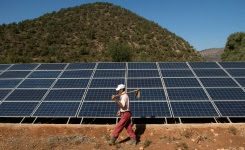Bangkok post
Writer: AFP
TAFOUGHALT (MOROCCO) – In the arid mountains of eastern Morocco, people know the value of water all too well.
“Every drop is like gold. It should almost be measured by the carat,” said local activist Najib Bachiri.
Eight hundred kilometres away in bustling Marrakesh, negotiators are this week thrashing out the details of a landmark global agreement designed to stave off disastrous climate change.
But in Tafoughalt, a little village deep in the mountains of Morocco’s Berkane province, that impact is being felt already. Rising temperatures are among the factors making the rains increasingly unpredictable.
As a consequence, life for the residents of Tafoughalt — who largely survive on subsistence farming — is becoming harder than ever.
“Here, the farmers work on small plots that are barely enough to feed their families,” says Bachiri, head of campaign group Homme et Environnement (“Man and Environment”).
The group is working to reverse an exodus from the mountains as people seek easier lives elsewhere.
Bachiri says local problems feed into each other; isolation makes life difficult, which encourages people to quit the countryside. Abandoned fields lead to land erosion, which in turn also spurs on the exodus.
And in the background, there is the constant shortage of water.
– Smuggling crackdown –
“For their fields, in the absence of electricity farmers rely either on rainwater or on pumping groundwater with diesel-powered generators,” says Bachiri.
Until recently, fuel for the generators was at least available cheaply thanks to rampant smuggling from across the nearby Algerian border.
But Algerian authorities have cracked down on the illicit trade since 2013, leading to a tripling in prices — from 10 euros ($11) for a 30-litre (eight-gallon) can to 30 euros.
And to make matters even worse for the fuel-reliant farmers, the Moroccan government has called a halt to diesel subsidies.
“Small-scale farmers here have not been able keep up, which has aggravated the agricultural crisis in these isolated villages and encouraged people to leave,” says Bachiri.
But a simple solution is making a big difference: using the sun from above to draw up what’s underground.
– Cheaper and cleaner –
With the help of local funds and international donors, Bachiri’s group has installed two solar water pumps in the mountains of Tafoughalt.
Two rows of black solar panels, two metres (2.2 yards) across and 10 metres long, are connected to a generator which feeds a pump extracting water from underground.
The equipment is durable and low-maintenance. The sunlight is unlimited in supply, but carries none of diesel’s downsides in terms of pollution and ill-health.
“Solar energy is so much better,” says 60-year-old local farmer Mahta Allal.
“The pumping is weaker in winter or when it’s cloudy. But it’s good for us when the sun is there — it can double the pumping and irrigation.”
Siddiq, who has guarded the local well for 17 years and as such is in charge of the community’s water-sharing arrangements, said the new system was far more convenient.
“Before, you had to go and collect fuel from very far away,” he said. “It was very tiring — and then there was the noise, the fumes, mechanical problems. Today it’s much better with the clean solar energy.”
The price of an hour’s irrigation has gone down by 75 percent, from 50 dirhams ($5) to 12.5 dirhams.
“It encourages agriculture,” says Siddiq. “Even if you don’t have a lot of land, at least you’ll be guaranteed a harvest to eat.”
Solar energy alone won’t be enough to solve Tafoughalt’s perennial water shortage. “That’s why we’ve installed tanks to collect river water, and we’re also working on installing technology to make the use of water more efficient,” said Bachiri.
But he said 450 farmers were already using the two solar pumps to water 100 hectares (250 acres) of crops.
“Some farmers are coming back to the village to work the soil again — it’s a good sign,” he said.







